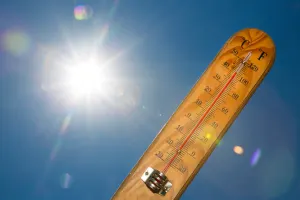
New study suggests heat waves can damage organs
The findings could pave the way for future research that improves diagnostics and treatment for individuals vulnerable to extreme heat events.
A new paper by researchers from the University of California, Irvine (UC Irvine) finds heat stress impacts brain, gut, and liver function.
The team used mice to analyze the effects of heat stress, which showed an increase in the production of ORM2, a liver protein, compared to the control group. They called this “proof of organ dysfunction” in the heat-stressed mice.
Experts typically associate heat with affecting cardiovascular function, but the new paper suggests the weather can have a much larger effect on our overall health, affecting us at the molecular level.
Based on analysis of heat-stressed mice, researchers believe prolonged heat exposure creates gut inflammation and imbalance, and the body increases the production of ORM2 as a coping mechanism. This appears to affect the brain through a “leaky blood-brain barrier.”
This could, over time, influence how food and nutrients are digested, which can affect brain function.
“In a dynamically changing global landscape, the imminent threat of climate change is evident in rising temperatures, raising concerns about intermittent heat waves,” Dr. Saurabh Chatterjee, a professor of environmental & occupational health at the UC Irvine Program in Public Health, said in a statement.
“Our heating planet is undoubtedly leading to acute and chronic heat stress that harms the health of our aging population.”
Dr. Chatterjee says the findings could pave the way for future research that improves diagnostics and treatment for individuals vulnerable to extreme heat events.
Hot weather safety tips
Drink plenty of water. Avoid caffeine and alcohol, which can be dehydrating.
Avoid direct sunlight, especially during peak hours and when the UV rating is high.
Wear lightweight, loose-fitting clothing.
Use air conditioning when possible. If you do not have access to air conditioning, consider visiting a cooling centre, a shopping centre, or a public library.
Check on elderly relatives and other vulnerable neighbors.
Avoid strenuous activities during the hottest parts of the day.
If you experience symptoms of heat-related illnesses like dizziness, nausea, or confusion, seek medical attention.
(Source: CDC - Extreme Heat)
Header image: Getty.










